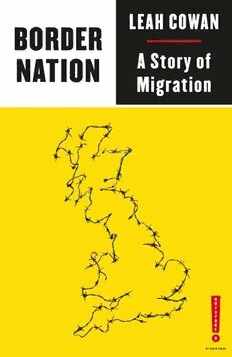
Border Nation: A Story of Migration (Outspoken by Pluto) PDF
Preview Border Nation: A Story of Migration (Outspoken by Pluto)
Border Nation Outspoken by Pluto Series Editor: Neda Tehrani Platforming underrepresented voices; intervening in important political issues; revealing powerful histories and giving voice to our experiences; Outspoken by Pluto is a book series unlike any other. Unravelling debates on feminism and class, work and borders, unions and climate justice, this series has the answers to the questions you’re asking. These are books that dissent. Also available: Mask Off Masculinity Redefined JJ Bola Behind Closed Doors Sex Education Transformed Natalie Fiennes Lost in Work Escaping Capitalism Amelia Horgan Feminism, Interrupted Disrupting Power Lola Olufemi Split Class Divides Uncovered Ben Tippet Border Nation A Story of Migration Leah Cowan First published 2021 by Pluto Press 345 Archway Road, London N6 5AA www.plutobooks.com Copyright © Leah Cowan 2021 The right of Leah Cowan to be identified as the author of this work has been asserted in accordance with the Copyright, Designs and Patents Act 1988. British Library Cataloguing in Publication Data A catalogue record for this book is available from the British Library ISBN 978 0 7453 4107 1 Paperback ISBN 978 1 7868 0702 1 PDF eBook ISBN 978 1 7868 0704 5 Kindle eBook ISBN 978 1 7868 0703 8 EPUB eBook Typeset by Stanford DTP Services, Northampton, England To my grandmothers Contents Acknowledgements viii Introduction: Why break down borders? 1 1. In the shadow of the British Empire 11 2. Whitewashing and the myth of the migrant ‘outsider’ 21 3. Why should migrants contribute? 42 4. Building borders through headlines and column inches 50 5. Everyday borders and de facto border guards 74 6. The violence of detention and deportation 98 7. Big business and the ‘profit motive’ for borders 111 8. Borderlands of resistance 126 Conclusion: Living beyond borders 141 Acknowledgements Thank you to the team at Pluto, in particular to Neda, for your precision, patience and enthusiasm, and to my agent Millie for her ongoing guidance. Thank you to those who have encouraged me to keep writing. My parents and sisters have provided unwavering support; Patrice Lawrence played a pivotal role in setting me on the road. Thank you to everyone who spoke to me formally and informally for this book, including my grandad, O.K. Cowan. Thank you to the Society of Authors for granting me the John C. Lawrence award which enabled me to take two unpaid months off work to finish this book. Thank you to Micha Frazer for your voice notes and dedicated unionising, a true comrade. Thank you Tamara-Jade and Marissa for your wise inputs – you’re still the smartest people I know. Thank you to the team at Anamot Press for your somewhat relentless encouragement. I am inspired and informed by the writers, thinkers and organisers who are working to break down Britain’s borders in different ways: UKBLM, JCWI, SOAS Detainee Support Group (SDS), Marai Larasi, Dorett Jones, Neha Kagal, Huda Jawad, Luke de Noronha, Empty Cages Collective, Community Action on Prison Expansion (CAPE), Docs not Cops, Corporate Watch, Anti-raids Network, Sisters Uncut, United Families & Friends Campaign (UFFC), the London Campaign Against Police and State Violence (LCAPSV), North East London Migrant Action (NELMA), and the New Economy Organisers Network (NEON). To Daisy, Delia and Soraya: I am eternally grateful for your love and care. Introduction Why break down borders? ‘Another world is possible beyond the plunder, exploitation and expropriation that are the bedrock of liberal democracies.’ – Akwugo Emejulu and Francesca Sobande ‘To struggle for a world without borders is to have hope . . . is to think that human beings can do better, and we do deserve better.’ – Bridget Anderson Borders are indisputably sites of violence. Borders create citizens and non-citizens, ‘aliens’ and nationals, undocumented people and sans papiers, ‘foreigners’ and expats. Borders segregate, cate- gorise and dehumanise us. They are the product of long histories of injustice, which means that we – our, flesh, bones and the very breath which keeps us alive – can be crudely termed ‘illegal’ in the eyes of the law. The phrase, ‘illegal immigrant’, which in Britain creeps from newspaper headlines to state policies and back again, encourages us to believe that we can be a violation of law and order as it is sold to us. However, laws and order are not objective truths, and borders have not always existed. Immigration laws, for example, are ideas crafted in the imaginations of the powerful to maintain their position and preserve the world as they like it. Borders are not real. The criminal ‘justice’ system and its agents such as border 1
